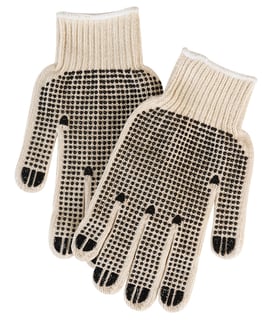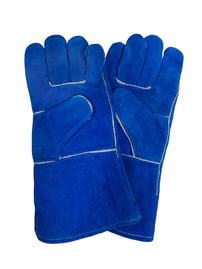Hand protection is something that is critically important in an industrial environment. Choosing the proper hand protection depends upon a variety of factors and how those factors will impact a worker who requires hand protection.
Gloves generally fall into 4 categories:
- Leather, Canvas or Metal Mesh Safety Gloves
- Fabric and Coated Fabric Safety Gloves
- Chemical and Liquid-Resistant Safety Gloves
- Insulating Rubber Safety Gloves
From a safety and efficiency standpoint, there are a few important things to consider when choosing the proper hand protection to suit job tasks.

Fit
The first important thing to consider for glove choices is fit. The proper fit must be determined by measuring the hand and following proper measurements to insure gloves feet properly, comfortably and securely.
Flexibility and Dexterity
Dexterity is one of the most important properties in any glove. Grip requirements matter when it comes to glove choices. Some jobs require more dexterity than others. Generally the thicker the glove material, the less dexterity the glove offers. Certain materials offer thinner gloves with greater dexterity. It is certainly a balancing act to choose a glove offering the most protection and the most dexterity.
Protection Against Chemicals
 Some gloves are resistant to many types of chemicals whereas other gloves only have limited resistance to certain types of chemicals. Resistance to chemicals from contact to total immersion also varies. The nature of contact as well as the duration of contact should be considered. In addition, how much protection is needed in terms of length of glove should also be a factor.
Some gloves are resistant to many types of chemicals whereas other gloves only have limited resistance to certain types of chemicals. Resistance to chemicals from contact to total immersion also varies. The nature of contact as well as the duration of contact should be considered. In addition, how much protection is needed in terms of length of glove should also be a factor.
Temperature and Abrasion Resistance
Temperature and abrasion resistance are other factors to consider when choosing gloves. How resistant gloves will be to temperature and temperature extremes will depend upon coatings as well as what material gloves are made of. Glove material also matters when it comes to how resistant gloves are to abrasion.
Toughness
Like temperature resistance, the toughness of gloves has much to do with their coatings. Different types of coatings offer different levels of toughness. Some gloves even come with varying degrees of toughness in different parts of the glove to protect areas of the that may be used more frequently for specific tasks.
Vibration Resistance
Hand-arm vibration from working on equipment may cause permanent numbness of the fingers. This may be a result of working with vibrating tools for many years. Tools such as power drills, chainsaws, pneumatic drills or other machinery that vibrates may cause this type of injury.
Gloves with gel pads can provide effective protection from vibration related injuries.
Cut Resistance
 There is a rating system from the American National Standard for Hand Protection Selection Criteria for cut resistance. Cut-resistant gloves are ranked based on the weight needed to cut through the materials. The higher the level, the more force applied to a sharp object the glove can resist.
There is a rating system from the American National Standard for Hand Protection Selection Criteria for cut resistance. Cut-resistant gloves are ranked based on the weight needed to cut through the materials. The higher the level, the more force applied to a sharp object the glove can resist.
Unfortunately there is no glove that offers protection from a circulating or serrated blade. Safety controls must be relied upon to prevent injury in instances where circulating or serrated blades are used.
Gripping Ability
Some glove surfaces are designed to be able to better grip slippery objects. They have coatings that were developed specifically to ensure better gripping ability. Most coatings repel oil and makes gripping slippery objects difficult. In coatings that allow oil to penetrate the gloves, it makes them better able to grasp the object.
Choosing the best gloves for job tasks being performed is an important balancing act and one that should not be taken lightly. It is a decision that can have long term affects and making good choices can be the difference between safety and injury.
*****
At Radwell International, supporting manufacturers on the plant floor is something we do well.
To learn more about Radwell can support your operation:

